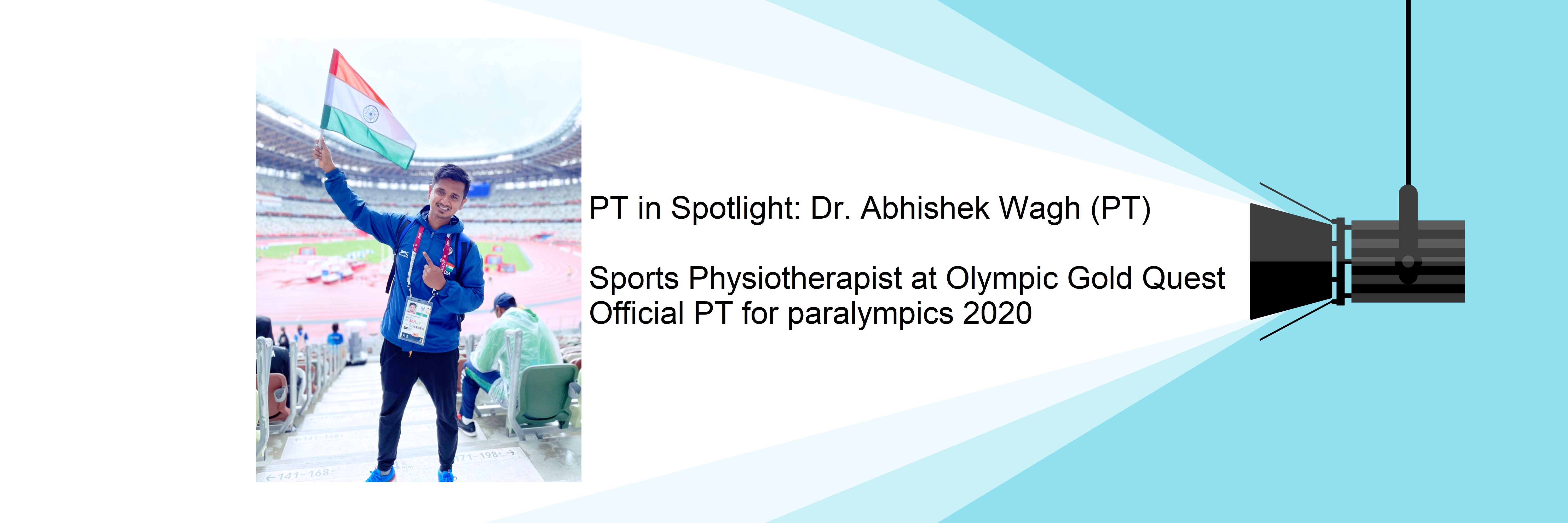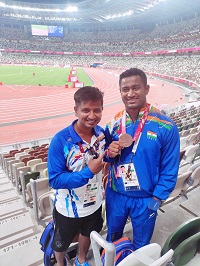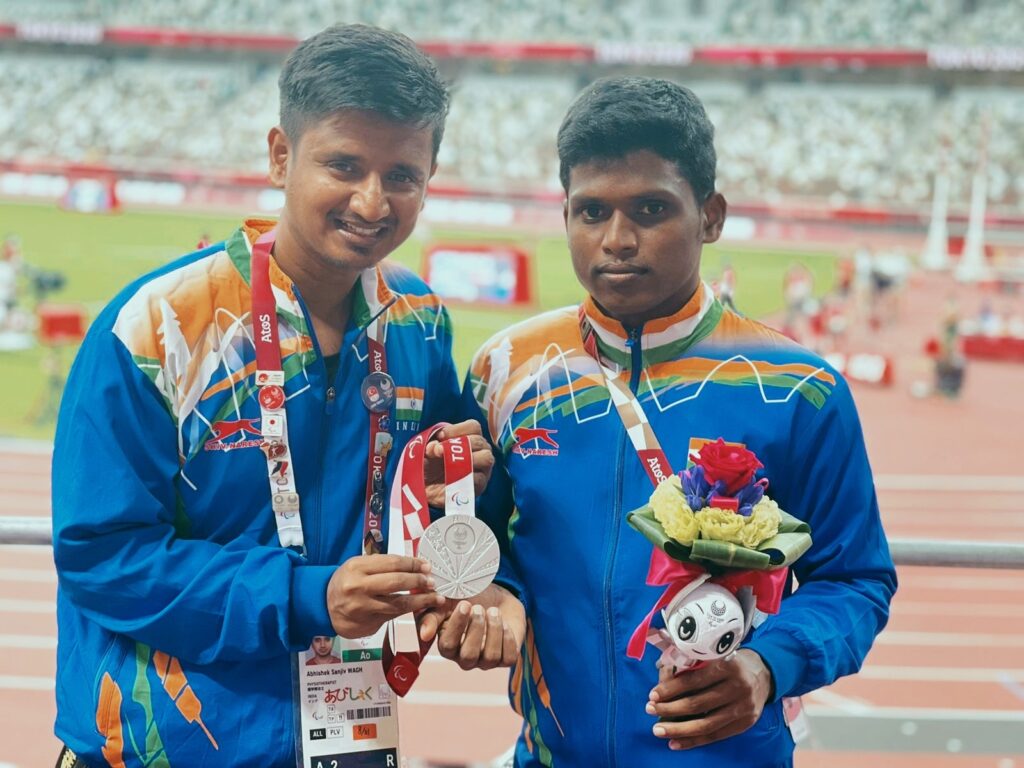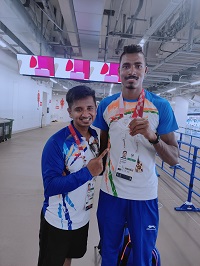
India has been participating in Paralympics since 1960. From then to last Paralympics, we managed to get 12 medals. But in the 2020 Paralympics alone, we got 19 medals. This week’s spotlight features a physiotherapist who was a part of the team supporting our para athletes. Go ahead and read Dr. Abhishek Wagh’s (PT) journey to understand what it takes to be a sports physiotherapist for para athletes.
What is your name, workplace and current position?
Dr. Abhishek Wagh (PT)
Sports Physiotherapist at Olympic Gold Quest (OGQ)
What is your educational background?
MPTh, Sports Physiotherapy: Gurunanak Dev University, Amritsar Graduation year: 2017
BPTh: Chaitanya Medical Foundation, Nigdi, Graduation year: 2015
When and why did you decide to become a sports physiotherapist?
I was fascinated by sports physiotherapy. Ever since my childhood, I used to play sports and was aware of the sporting injuries. I always wanted to work on field, in a dynamic work environment, and play role in an athlete’s betterment.
When it came to treatment, I was always inclined towards the options that addressed the pain immediately. In 2015, I attended Brian Mulligan’s conference. I saw him treating patients on the spot and reducing their pain. I was amazed by that. Also, I used to watch matches, where players were getting ready to play soon after a physiotherapist treated them after an on-field injury. This influenced me, and I was naturally drawn towards sports physiotherapy.
Why did you decide to choose Gurunanak Dev University for Masters in sports physiotherapy?
My university was first to start a Master’s program in sports physiotherapy in India. The college is considered to be one of the best colleges for sports physiotherapy in India. Before enrolling I visited the university campus and I liked it. They conduct various national sports events. They have a huge cricket ground, cycle aerodrome and hockey turf. This ensured me of prominent practical exposure, which I feel is very important, as the application part is equally important with academic knowledge.
For admission, I had to give an entrance exam. They selected the top 30 for the course. The master’s course was for 2 years.
What did you do soon after graduation and for how long?
After my bachelor’s program and during internship, as I was interested in sports, whenever I got an opportunity, I did a lot of volunteer work as physiotherapist for marathons and various football and cricket matches. I tried to gain as much experience as I could. I enrolled for my post-graduation in the same year, as I completed my graduation as I didn’t want to lose the academic momentum.
After my post-graduation in sports, I circulated my resume all over through mail, LinkedIn and even started connecting and meeting with people already working in sports and sporting organizations. By this I got an opportunity to work at a startup sports clinic in Pune. At the same time, I started doing some home visits, to keep myself busy.
There is a high chance of not getting the job of your choice as soon as you graduate, especially in sports. So, I feel it is very important to be busy, proactive and patient, to avoid stress in the initial stage of a career.
Finally, after 2 months my resume got selected as a sports physiotherapist of India under 16 football team which was a very big opportunity to get in the early part of my career. The coach liked the career objective I wrote on my CV. So, you really never know what clicks off, you should just be able to keep calm, be proactive and be there at the right place at the right time to grab on to the opportunity.
The camp was in Goa at that time. I covered the South Asian Football Federation Championship and Asian football championship Qualifiers with them. Later, I covered several other tournaments with them. I could apply what I learned in masters and during the workshops when working there. The experience which I gained from my first on field job, working at such high level was immense, because I faced maximum pressure being a newbie.
In 2018, I joined OGQ( Olympic Gold Quest)
How did you get a job at OGQ?
Basically, one of my batchmates joined OGQ after graduation. That is how I came to know about the OGQ. I submitted my resume to them after post-graduation. But I did not hear back from them immediately. Eventually, I got busy with the India under 16 football team. Later, they reached out to me when there was a vacancy.
What was the hiring process for OGQ?
I was called for an interview. There were some basic questions and some practical questions. They also gave me a simulated case and asked for the treatment program. Following the second interview, I got hired.
I think my education in sports along with my experience contributed towards me getting selected for OGQ.
Tell us more about your journey at OGQ
Initially, I started working with junior shooters and then with some junior archers. Later I worked with some of the senior boxers, wrestlers and badminton players as well.
Some of the boxers I worked with, such as Manish Kaushik and Amit Panghal for prehab camps, later went to Tokyo 2020 Olympics. I really feel proud that even the players I worked initially with, from junior shooters, like Elavenil Valarivan and archery team with Pravin Jadhav, Tarundeep Rai, Deepika Kumari and Atanu Das went on to represent India in Tokyo 2020 Olympics.
Additionally, I feel lucky that I have travelled and covered several tournaments with all these players across so many sports in such a short period of time under one organization. Cherry on top was getting to go to recently finished successful Tokyo Paralympic games.
How did you transition to working as a physiotherapist for para-athletes?
By the end of 2019, OGQ started supporting para-athletes. There was a player named Rana Soman who was injured during the para world championship. He is an above knee amputee for the left leg, I started working extensively with him from December 2019 till the beginning of lockdown.
Along with Rana Soman, I also started treating Ajeet Singh who is an above elbow amputee a Javelin Thrower. This was my first exposure to working with para-athletes. These two also qualified for Paralympic.
In January 2021, OGQ had an opening for a sports physiotherapist for para-athletic camp for Tokyo Paralympic. Ever since then I officially started working with para-athletes.
Tell us more about your work as a physiotherapist for para-athletes.
I started working with 2 high jumpers, 1 discus thrower, 2 shot putters and 1 javelin thrower. Each of them was of a different category of disability in terms of classification. I started working with them for the Paralympics from January 2021.
Soon, I covered the Dubai World Para athletic championship. I was amazed by my para-athlete’s capabilities and what they could achieve. Para-athletes get classified based on their disabilities. They get assigned in different categories based on their type and severity of disability and sport they play. Our athletes get classified at various international tournaments by authorized classifiers.
I was working with them in Bangalore SAI, where I was taking care of them on a day-to-day basis, in terms of injury treatment, rehabilitation of ongoing injury, prehabilitation, medical needs and coordination with nutritionist, psychologist and coach and thus helping athletes, to enhance performance from all aspects.
Later I went with them for the Paralympics. Our country has been participating in the Paralympics since 1960. By 2020, we managed to get 12 medals. But in the 2021 Paralympics alone, India got 19 medals which involves 5 Gold, 8 Silver and 6 Bronze medals.
I worked with 3 medalists, Nishad Kumar, Mariyappan Thangavelu and Sundar Singh Gurjar. One of my other athlete also got a bronze medal but due to the classification system, his medal was cancelled.



How different is it to work as physiotherapist for para athletes?
As a physiotherapist, I had to design a prehab program for an individual athlete based on their disability. For example, I was working with two high jumpers, Nishad Kumar and Mariyappan. Ideally you will have a similar conditioning program, but in para this is totally different. Because both have different disability, Nishad is above the elbow amputee, and Mariyappan has lower limb disability with severe limb length discrepancy. So, while designing prehab these factors played a major role.
You always need to keep in mind their disability classification and work accordingly. For example, we worked with a discus thrower who was wheelchair bound. We had to train him using available trunk rotation and arm strength.
Another example, Nishad Kumar, who got a silver medal. As I mentioned earlier he is above the elbow amputee. Someone may think in this particular scenario, this disability might not affect his performance since high jumping involves lower extremities. But these people forget that not having an upper limb on one side tremendously affects an athlete’s overall balance, especially in air, and he tends to wobble on the affected side. So, I trained him accordingly. The prehab program involved working on his balance and core strength. Conditioning which focused on recruiting obliques, and firing kinetic chain, by giving him strategies and cues to avoid losing balance.
Another important thing when especially working as a physiotherapist for para athletes, you should not hesitate to be a caregiver or an escort when needed to these athletes, as athlete’s betterment is what we seek for.
Needless to say, all the para-athletes suffer from other common sports injuries such as shin splints, IT band syndrome, strains, sprains etc. So as a physiotherapist we need to address those injuries as well.
Remember that it is teamwork. At OGQ we have a team of sports nutritionists, sports psychologists, physicians along with physiotherapists. We also follow regular athlete monitoring through various test batteries which helps us to track and improve their performance.
What is a typical day of work for you?
It differs from sport to sport. Our job usually is more after athletes complete their training sessions. It is equally important before and during the training sessions, to keep a check on athlete’s warmup, if they require any taping, training form, training loads, or any on-field injury. Sometimes our day starts as early as 5 – 5:30am. If you are in a national camp, your work can go on until late at night.
Athletes usually have 2 half days off in a week in addition to a day off on a Sunday. But as a physiotherapist we may continue to work depending on the need.
What do you like about your work?
I enjoy everything. Right from treating injuries to the prehab process. I like work such as designing reaction drills for boxers, agility drills for badminton players etc.
Besides, seeing these para-athletes performing on superhuman capabilities often gives me goosebumps.
What are the challenges you face?
Sometimes communicating with the coaches can be challenging. You need to communicate patiently what you are doing and why it is important for the player. It can take some time to build athlete’s and coach’s trust in you.
At the same time, you need to make sure that the athlete is not completely dependent on you. They should be able to perform well even when you are not with them.
My job involves a lot of traveling, international and domestic. I enjoy traveling so it doesn’t bother me as much.
What are the courses, workshops and books that helped you?
I think my master’s course helped me for sure. Brukner and Khan’s Clinical Sports Medicine is one of my favorite book.
In terms of workshops, I still apply what I learned in workshops for K taping, dry needling, Mulligan, Maitland and MFR. You should be able to use all these treatments in a combination suitable for an athlete in front of you. Don’t get stuck preferring one method over another.
What is your advice for someone who specifically wants to work as a physiotherapist for para- athletes?
Personally, I feel that they should pursue master’s in sports. Additionally, try and take experience in covering different sports. Even if you get volunteer work in the beginning, do that. Keep on circulating your CVs. Make connections with people in this field, because there is no structure as such, at least in India.
What is your advice for new physiotherapy graduates?
I would like to mention that we, as physios, need to keep an open mind. Just because things are not happening our way doesn’t mean they are wrong. We need to adapt to the athletes’ environment and their mindset. We should be able to trust our basics. And should be willing to help athletes in whatever way we can to improve their performance.
Keep patience, especially in the beginning. Continue working as and how you can and learn from all the experience. Because I feel that, experience is one of our greatest teachers. Moreover, keep upgrading yourself. Continue learning as physiotherapy is such a volatile field. You have to be on your toes all the time and adapt to new changes.
What is next for you?
I plan to continue working with OGQ and contribute more and more to sports in India. I may explore education in the para-athlete classification system.
Where can people reach you?
They can reach me on instagram and Linkedin.
Related Articles:
Senior Physiotherapist at Olympic Gold Quest | Dr. Aalaap Jawdekar (PT)
Strength and conditioning Academy India, Co-founder and Director | Dr. Apurva Mathankar (PT)
Hello, My name is Tejashree Limaye. I am a physiotherapist with 10+ years of experience. I help you go from being stuck in your career to finding a job you love! I provide career guidance about clinical and non clinical PT career in India. I also help you with US PT licensing process. Welcome to my blog, I hope you find the exact guidance you have been looking for!
